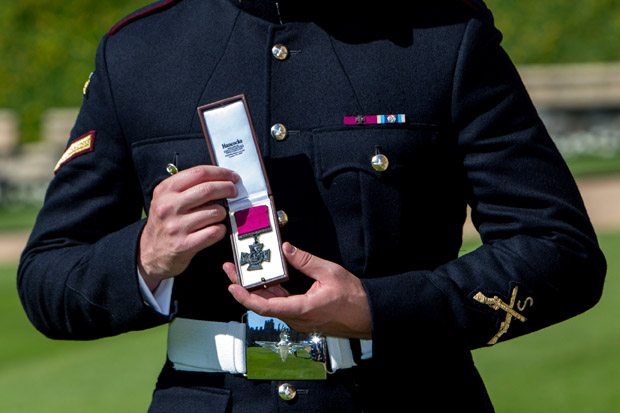‘It is the task of a Patton or a Napoleon to persuade soldiers that bits of ribbon are intrinsically valuable. The historian’s job, in part, is to spot contradictions and unravel obfuscations, and the history of the VC is steeped in both.’
To this job of de-obfuscating, Gary Mead, former journalist and military historian, might well add ‘though the heavens fall’. For although he concedes that, remarkably, the Victoria Cross remains ‘one of the few British institutions that is untarnished by accusations of corruption, scandal, political intrigue or manipulation’, the procedure for awarding the highest British decoration for courage in the presence of the enemy is ‘peppered with anomalies, contradictions, prejudice and favouritism’, as well as political convenience.
None of this could have been gainsaid 100 years ago, but, he argues, the system now needs urgent reform, not least because the medal that recognises supreme valour is becoming an endangered species. For a start, the VC committee, comprising principally the MoD’s permanent under-secretary and the service chiefs of staff, has over the years so loaded the decoration and themselves with arbitrary requirements that it has become almost impossible to win it, even posthumously. These requirements include: the need to protect the value of the medal by not over-awarding it; a 90 per cent chance of the recipient’s being killed in action; and, given his godlike status (he — so far not she — is traditionally saluted by the highest ranks), the recipient’s ability to handle the honour. I put all this to one field marshal, a soldier of considerable operational experience, who agreed wholeheartedly.
At the time of its institution ‘for valour’ late in the Crimean war Victoria’s cross was the only medal for bravery available for officers, who were otherwise rewarded by appointment to an order such as the Bath, though this tended to be for signal service rather than brave deeds — the latter being expected of gentlemen. The other ranks’ Distinguished Conduct Medal had been instituted at the beginning of the Crimean war for ‘distinguished, gallant and good conduct in the field’; but in the absence of good tactics there was of necessity much valour, and hence the need for the VC, which also did much for the standing of the monarchy.
This pattern — tactical disaster recovered by heroism — continued throughout Victoria’s other wars, the VC becoming a proud feature of every campaign or battle, of which perhaps Rorke’s Drift was the most prolific example, as well as one of the most unedifying. There was even a case of a general attempting to propitiate a senior for his own military sins by recommending the VC for the senior’s son.
The situation became more complicated in the first world war, with mentions in despatches and the institution of the Military Cross for officers and warrant officers, and the Military Medal for other ranks (the Distinguished Service Order for officers had been instituted in the 1880s), for now began the tricky, subjective grading of courage, which is even more graduated today by a number of supplementary decorations. Thus the VC has been progressively ramped up, so that it is no longer ‘for valour’,
however defined, but for supreme bravery, at the very top of a pyramid of courage — of a pedestal, indeed.
But who sees the courageous act carried out? And is not courage in the eye of the beholder? One of the several reforms that Mead advocates is the reactivating of the secret ballot, the system whereby the survivors of a battle vote who was the bravest and to whom the VC should therefore go. The same field marshal I spoke to also thought the ballot a sensible idea, as long as it was a stage in the assessment process. Mead may indeed be pushing at an unlocked, if not yet open, door.
He has in fact produced a thorough, cogent and almost unarguable case that the system needs looking at, as well as much of the basis of the actual reforms. Now, with a pause in operations, is the time to take a look at how well the whole system of honours and decorations works. And perhaps in such a review, the army having regained operational maturity and senior officers some confidence, we might ask whether John Major’s misplaced egalitarianism in opening all awards to all ranks really serves the forces — the army in particular — as well as he had hoped. Why on earth, for example, did anyone think the DCM was somehow inferior to the MC (for that is what it boiled down to, thanks to the rank qualification), and that magnificent medal therefore discontinued, with yet another (the Conspicuous Gallantry Cross) instituted?
‘It is the task of a Patton or a Napoleon to persuade soldiers that bits of ribbon are intrinsically valuable.’ Two world wars and countless campaigns had established the ‘tariff’ better than anything derived from scratch, which is what the 1993 medal review tried to do. A century of fighting told every soldier what it took to win a DCM, an MC or an MM. Mead’s book, let alone the opinion of mess and canteen, suggests that if you first sort out the system of awarding the VC, the rest will fall into place.






Comments